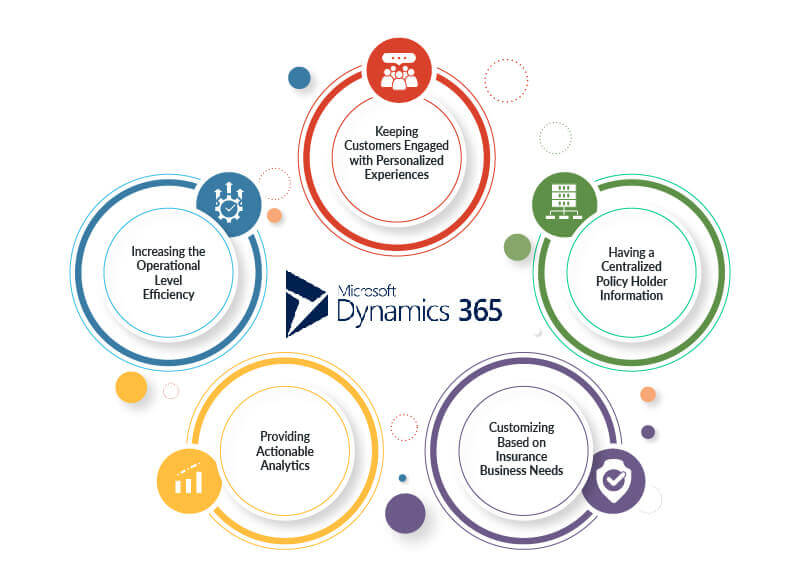The pandemic caused a significant spike in demand for insurance, with strong life insurance premium growth in several markets worldwide. With sudden growth, managing customers while providing them with a unique experience became a significant challenge for the insurance industry. The blog gives a glimpse of the insurance industry today, the challenges faced, and how can Microsoft Dynamics 365 CRM for insurance mitigate these challenges.
The Insurance Sector: Present Day
With Covid-19 and other health hazards looming large as we look at the future, one of the beneficiaries of this will be the Insurance companies. Whether it be the normal health insurance covering one entire family or the term insurance domain, an individual would like to secure and ensure the safety of his and his loved ones as he sees the unforeseeable future.
IT Spending in Insurance
Gartner forecasts global IT spending within insurance to grow by 5.2% in 2021 and reach $210 billion in constant U.S. dollars. Long-term spending is expected to grow at a CAGR of 6.4% to $271 billion in 2025, driven by IT services and software growing at a CAGR of 7.9% and 11.2%, respectively.
As digitalization picks up steam and encompasses an ever-wider share of the insurance value chain, only improving certain sections is not enough. Data being the new oil needs to be properly utilized to obtain the full benefits of digitalization. Insurance companies are now looking to modernize their IT legacy system with new platforms and tools available and benefit from the new systems.
One of the tools which will help Insurance companies to achieve the above is Microsoft Dynamics CRM. Customer relationship management (CRM) helps manage a company’s relationships and interactions with customers and potential customers. The goal is simple: Improve business relationships. A CRM system helps companies stay connected to customers, streamline processes, and improve profitability.
But what are the day-to-day challenges which are faced by the insurance sector and how can Microsoft Dynamics CRM mitigate those challenges. Let us have a look.
Challenges Faced by Insurance Industry:-
- Data in Silos: Many insurers have siloed technology solutions to manage three groups. The prospect management system stores the prospect’s information, and the data is leveraged only by marketing and distribution from separate systems.
Hence, such a process makes the customer service less efficient and disappoints the end customer with multiple touchpoints. - The Old Deprecated CRM: Legacy Old CRM systems typically store the policyholder information. The other important details, such as core policy, billing, and claim, are retrieved from other systems.
Policyholders now have more diverse and complex requirements and are more aware of their choices. As a result, they want a touch of personalized experience. Hence, insurers must digitize services to find customer behavioral patterns to leverage data analytics. - Lack of Omnichannel & Storage Management: The business’s entire distribution management lifecycle has databases and systems to manage its relationships and interactions with producers and agents. However, a distinct trend exists to consolidate relationship information about all three parties into the standard CRM system.
Omnichannel distribution is necessary to improve customer interaction quality. It can help insurers increase customer satisfaction and loyalty. As a result, customers will gain enhanced experiences, tailored, perfect information, and quicker claims resolution. - On-premises Storage Setups: On-premises people call for unnecessary physical space. With digitization, the system can be easily shifted to SaaS-based platforms and could help improve operational productivity. Because of this, it will help the insurers serve the policyholders in the best possible way.
- Information Security & Trust in Technology: The biggest challenge with insurers is to adopt technology and convince the prospects that the stored data is safe and efficiently retrievable on demand. However, it can revolutionize the insurance industry and help keep up with the advancements once achieved.
How can Microsoft Dynamics 365 CRM mitigate these challenges in the insurance sector?

1. By Increasing the Operational Level Efficiency
We can increase operational efficiency by creating a central repository for policyholder information, streamlining data input, eliminating redundancies, and making it easier for members and brokers to find information. CRM for insurance helps automate customer-facing tasks with unique workflows, reducing overhead costs.
2. By Keeping Customers Engaged with Personalized Experiences
Having a track record of each customer, their likes and dislikes, and the customer’s interaction history will help give a more personalized experience resulting in a holistic customer management capability.
3. By Having a Centralized Policy Holder Information
Giving the staff and agents of the insurance firm role-based access to customer history, preferences, key relationships, profitability, and support records helps them increase client confidence and productivity.
4. By Providing Actionable Analytics
CRM for insurance will help deliver powerful, contextual analytics and key performance indicators to the desktops of sellers and brokers on new policies, client communications, claims to process, and more so they can make better-informed decisions. It helps keep up with the business using real-time dashboards that provide insight into clients, brokers, risk exposure, sales activities, and sales performance by region, branch, and agents.
5. Customizing Based on Insurance Business Needs
One can customize the CRM application based on the insurance company’s needs. Whether you need forms for policy renewals, annual premiums, policies by coverage type, application submission status, or agent productivity, one can create a CRM based on your needs. You can create forms in Excel, but it is much more manageable in CRM!
Conclusion
Microsoft Dynamics CRM addresses the challenges cited above and provides apt solutions for the insurance sector. Additionally, Dynamic CRM systems are adaptable to accommodate insurers of different levels, varieties, and styles. Insurers can utilize Dynamics CRM’s capabilities to offer seamless customer service at all touchpoints.
Hexaware, a Microsoft Gold Partner, is built on a solid foundation of best practices, tested methodology, years of experience in insurance CRM solutions, and over 3000 certified Microsoft consultants. We enable future enterprises with intelligent Dynamics CRM that provides proactive and predictive services for your customers with an ideal and trailblazing experience. To know more, get in touch with the experts.



















